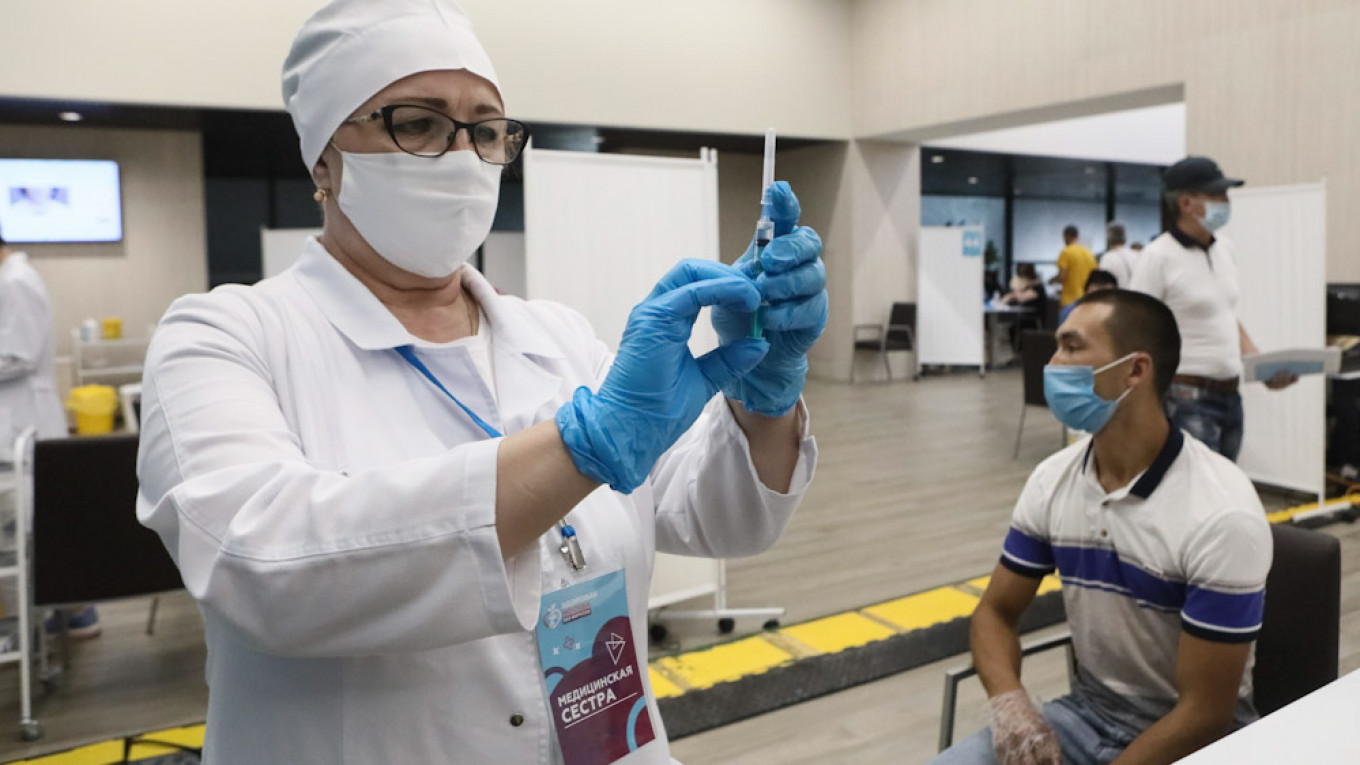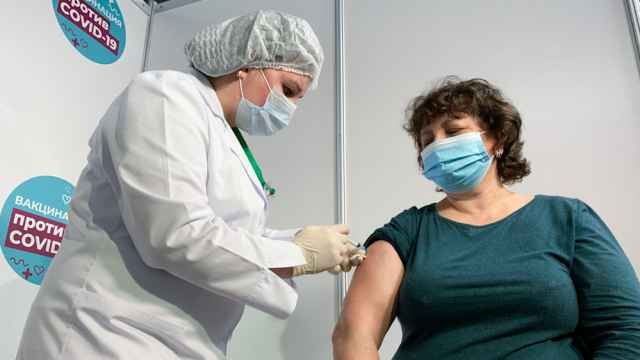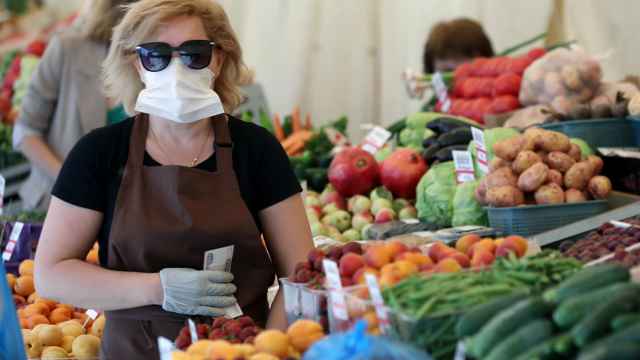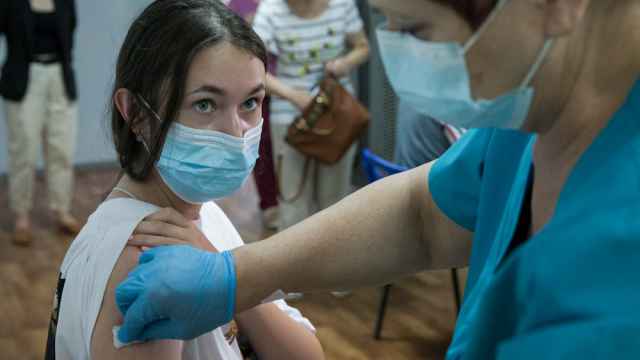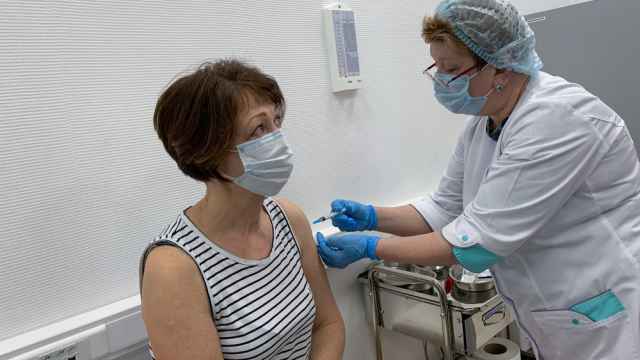Businesses across Russia are racing to inoculate their employees against the coronavirus in order to meet new rules on mandatory vaccinations.
Moscow’s service sector firms — from supermarket chains and bank branches to restaurants and bars — have until Friday to ensure at least 60% of their employees have received a first dose of one of Russia’s homemade vaccines, or face being fined or shut down by the authorities.
Another 21 of Russia’s 85 regions have introduced similar requirements, with deadlines falling before the end of the month.
But companies say they face a host of difficulties in meeting the deadline — imposed only last month as a Delta-fueled third wave took hold across the country — including vaccine shortages, difficulties vaccinating migrant workers, the summer holiday season and opposition from employees.
In Moscow, only 25% of food-service workers have been vaccinated, the Kommersant business paper reported Tuesday, citing figures presented at a government meeting. Among non-food retail chains, the share of workers vaccinated rose to 45%.
Businesses employing an estimated 4 million workers in Moscow fall under the requirements, meaning at least 2.4 million will have to have been vaccinated by Friday’s deadline.
Overall, the sector looks poised to fall short, but for some large businesses hitting the 60% target will be touch and go.
Anton Maximenko, HR Director at discount retail chain Fix Price, told The Moscow Times vaccination rates among staff at its shops and distribution centers in Moscow and the Moscow region stood at 50%.
“We see those numbers growing significantly every day,” he said, saying he was “optimistic” about the company’s overall push to encourage staff to get vaccinated.
Supermarket chain Metro said its nationwide vaccination rate was also at 50%. But it reported regional vaccine shortages as well as problems in tracking and encouraging vaccinations among its temporary workers provided by employment agencies.
Supermarket chains X5 and VkusVill also said vaccination rates were increasing rapidly as the July 16 deadline in the capital approaches, though refused to say how many staff had currently been vaccinated.
The 50% inoculation rates at Metro and Fix Price are significantly higher than in the country as a whole, with just 20% of Russians having received at least a first dose.
Russia’s daily vaccination rate has more than doubled since the announcement of mandatory vaccination campaigns, with the country now administering around 700,000 vaccines a day, according to the Gogov website.
Jab shortages have been reported in a number of cities across Russia as deliveries of the vaccine from Moscow have been unable to keep up with the jump in demand triggered by the mandatory vaccination campaigns.
“Among factors that are preventing us from increasing vaccination rates further are annual leaves and enormously high demand at vaccination centers: It can take days or even weeks to get a slot,” said Fix Price’s Maximenko.
Businesses are using a mix of incentives to encourage vaccination — ranging from small cash bonuses, extra vacation days or free vaccination in private clinics.
For the few companies who have managed to get past the 60% threshold with days to spare, bosses say it has taken a lot of work.
Fast food chain Dodo Pizza said it had vaccinated 65% of its staff. “We’ve done a lot of educational work — debunking myths about vaccination and eliminating fear,” CEO Ilya Farafonov told The Moscow Times.
“We held a series of live broadcasts for staff with scientific journalists, we had a private hotline on social media where employees could ask any question about vaccination and get an answer within two hours, and we pay cash bonuses of 2,000 rubles ($27) upon completion of the vaccination course.”
Authorities have also told businesses they are allowed to send staff who refuse to be vaccinated on unpaid leave.
A SuperJob survey published Tuesday found that 20% of workers said somebody in their organization had been fired for refusing to be vaccinated.
Some firms have also seen an increase in the number of workers filing documents for medical exemption from vaccination, prompting concerns about a possible black market in fake medical notes.
Immediately after mandatory vaccination campaigns were announced, authorities were forced into a crackdown of sites and Telegram channels purporting to sell fake vaccination certificates which, with the help of medical professionals, included adding a buyer’s details to the government’s nationwide vaccination database.
Kommersant reported the Russian government is considering refraining from dishing out immediate fines for firms that fail to hit the 60% threshold on time in acknowledgement of how many businesses are likely to fall short.
A Message from The Moscow Times:
Dear readers,
We are facing unprecedented challenges. Russia's Prosecutor General's Office has designated The Moscow Times as an "undesirable" organization, criminalizing our work and putting our staff at risk of prosecution. This follows our earlier unjust labeling as a "foreign agent."
These actions are direct attempts to silence independent journalism in Russia. The authorities claim our work "discredits the decisions of the Russian leadership." We see things differently: we strive to provide accurate, unbiased reporting on Russia.
We, the journalists of The Moscow Times, refuse to be silenced. But to continue our work, we need your help.
Your support, no matter how small, makes a world of difference. If you can, please support us monthly starting from just $2. It's quick to set up, and every contribution makes a significant impact.
By supporting The Moscow Times, you're defending open, independent journalism in the face of repression. Thank you for standing with us.
Remind me later.


